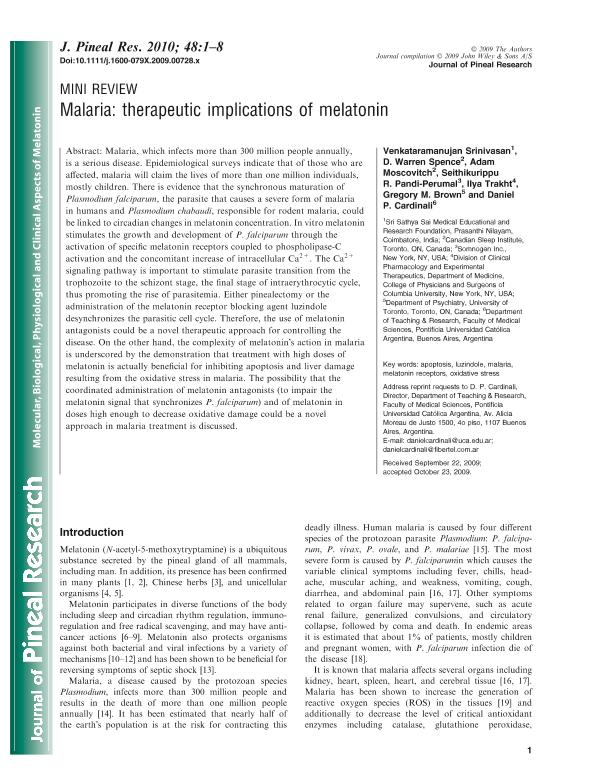Artículo
Malaria: Therapeutic implications of melatonin
Srinivasan, Venkataramanujan; Spence, David Warren; Moscovitch, Adam; Pandi Perumal, Seithikurippu R.; Trakht, Ilya; Brown, Gregory M.; Cardinali, Daniel Pedro

Fecha de publicación:
01/2010
Editorial:
Wiley Blackwell Publishing, Inc
Revista:
Journal of Pineal Research
ISSN:
0742-3098
Idioma:
Inglés
Tipo de recurso:
Artículo publicado
Clasificación temática:
Resumen
Malaria, which infects more than 300 million people annually, is a serious disease. Epidemiological surveys indicate that of those who are affected, malaria will claim the lives of more than one million individuals, mostly children. There is evidence that the synchronous maturation of Plasmodium falciparum, the parasite that causes a severe form of malaria in humans and Plasmodium chabaudi, responsible for rodent malaria, could be linked to circadian changes in melatonin concentration. In vitro melatonin stimulates the growth and development of P. falciparum through the activation of specific melatonin receptors coupled to phospholipase-C activation and the concomitant increase of intracellular Ca2+. The Ca2+ signaling pathway is important to stimulate parasite transition from the trophozoite to the schizont stage, the final stage of intraerythrocytic cycle, thus promoting the rise of parasitemia. Either pinealectomy or the administration of the melatonin receptor blocking agent luzindole desynchronizes the parasitic cell cycle. Therefore, the use of melatonin antagonists could be a novel therapeutic approach for controlling the disease. On the other hand, the complexity of melatonin's action in malaria is underscored by the demonstration that treatment with high doses of melatonin is actually beneficial for inhibiting apoptosis and liver damage resulting from the oxidative stress in malaria. The possibility that the coordinated administration of melatonin antagonists (to impair the melatonin signal that synchronizes P. falciparum) and of melatonin in doses high enough to decrease oxidative damage could be a novel approach in malaria treatment is discussed.
Palabras clave:
Apoptosis
,
Luzindole
,
Malaria
,
Melatonin Receptors
,
Oxidative Stress
Archivos asociados
Licencia
Identificadores
Colecciones
Articulos(SEDE CENTRAL)
Articulos de SEDE CENTRAL
Articulos de SEDE CENTRAL
Citación
Srinivasan, Venkataramanujan; Spence, David Warren; Moscovitch, Adam; Pandi Perumal, Seithikurippu R.; Trakht, Ilya; et al.; Malaria: Therapeutic implications of melatonin; Wiley Blackwell Publishing, Inc; Journal of Pineal Research; 48; 1; 1-2010; 1-8
Compartir
Altmétricas



